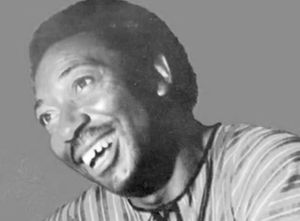Nashil Pichen Kazembe
Nashil Pichen Kazembe | |
|---|---|
 | |
| Born | 1932 |
| Died | 1991 |
| Occupation | Musician |
Nashil Pichen Kazembe (1932–1991) was a Zambian musician from Luapula Province of Zambia who became an African music star in the 1970s. He spent a long time in Nairobi, Kenya, where he collaborated with fellow Zambia emigre Peter 'Tsotsi' Juma who was from Mbala in Northern Province on the Zambia-Tanzania border and Benson Simbeye.
Early life and career
Kazembe was born in Chief Nsama’s area close to the Congolese border in Kaputa District, Luapula Province in 1932 and a relative of the Mwata Kazembe kingship of the Lunda kingdom. He taught himself how to play homemade banjos and later, a guitar and traversed Congo and Tanzania many times.
Years later in 1953, he went to work in the mines in South Africa, where he formed his maiden band, the Bantu Negroes but disbanded after Kazembe returned to Zambia the following year, to become a business executive.
Music career
As members of 'Eagles Lupopo Band' they sang 'patriotic songs' praising President Kenneth Kaunda and commenting on various social issues.
Nashil Pichen ended his career as a solo artiste after returning from Kenya to Lusaka. His 1970s hit "aPhiri Anabwera" was the first single to sell more than 50,000 units in Zambia. It was a song about Mr Phiri - a long lost migrant worker who returns home from the city empty handed only to find that no one in his village remembers him. Pichen had earlier scored a string of hits with his Super Mazembe band singing in Zambian, Congolese and Kenyan languages. Although he returned to Zambia in the 1980s and recorded a number of albums there, Kenya knows him more for his Nairobi hits. It was in Kenya that he developed his unique style of combining Zambian traditional music with Congolese, Kenyan and Southern African urban rhythms like soukous, benga music and kwela. He was also very popular in Zimbabwe.
Identity and origin
Because of his fame in East Africa, most believed that Kazembe was actually Kenyan. To this date, he is known more among Kenyans than Zambias because he had settled there as early as 1958. On the other hand, because of his style of music and the way he sometimes dressed, others believed he was Congolese. A lot of his Zambian-Rhumba songs competed fiercely with original Congolese musicians such as, John Bokelo, Baba Gasto Ilunga, Dr Nico and many others.[1]
Lyrical controversy
During his visit to Kitwe’s Mindolo Mine Township on the Copperbelt, he interacted with miners and this culminated into the release of a hit song, "Abalumendo Ba Ku Mindolo" (Men of Mindolo), which angered them as it exposed and criticised their drinking habits, including begging and scrounging for a local brew called Kangala or Ikanga as it was better known during weekends, instead of looking for employment. The miners did not take this kindly and declared Mindolo, a no go area for Pichen as they threatened to manhandle and beat him up.[1]
Kazembe spared no one in terms of gender in his songs such as, Chilyelyelye Uleke (Uletekanya mune, ukalya nechakukulya), which attacks gluttons who might end up consuming poisonous food.
Later life and death
Although Kazembe had such a successful music career, at the time of his death he was a very poor man. No family members or offspring are known.
References
- Pichen at Allmusic.com
- ↑ 1.0 1.1 PITCHEN KAZEMBE LEGACY LIVES ON by Davies M. M. Chanda, Times of Zambia, 7 March 2014